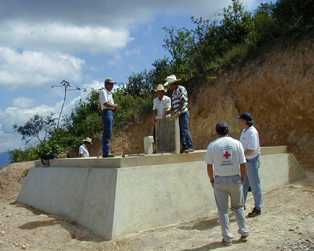Sustainability Research
This information is provided by the National Center for Environmental Health’s Environmental Health Services Branch for informational and historical purposes. The GWASH function is now in another CDC organizational unit. This information is not maintained and may no longer be current and/or accurate.
Goals and Objectives
Sustainability is a major factor for water, sanitation, and hygiene interventions throughout the world. Program sustainability measures the effectiveness of an intervention’s operation and maintenance over the long term, with local in-country support providing most if not all funding and leadership. CDC’s Global Water, Sanitation, and Hygiene team seeks to understand the factors that contribute to the sustainability of water, sanitation, and hygiene interventions—as well as barriers to sustainability—by research and assessment of current water and sanitation construction and hygiene education interventions.
CDC’s data collection and intervention assessment measures
- The functioning and suitability of improved water and sanitation systems, and
- The retention and application of hygiene education related to hand washing, water collection and treatment, and sanitation practices.
By measuring the sustainability of water and sanitation construction and by hygiene education interventions, the Global Water, Sanitation, and Hygiene team can evaluate factors that aid in explaining the successes and failures of programs and provide lessons learned.
Activities
Central America Water and Sanitation Sustainability Project
For more information about the success of this project, read Water, Sanitation, and Hygiene Sustainability Project [PDF - 192 KB].
 In conjunction with the American Red Cross (ARC), CDC’s Global Water, Sanitation, and Hygiene team is conducting a sustainability project in Central America. The project will determine the effectiveness of water and sanitation interventions that ARC funded in 1998, after Hurricane Mitch. This is the first time ARC has examined its post-disaster water and sanitation construction and hygiene education interventions over the long term. Because this project is ongoing, CDC’s team can gather research on the level of sustainability of these interventions and learn how certain factors may affect sustainability over an extended period.
In conjunction with the American Red Cross (ARC), CDC’s Global Water, Sanitation, and Hygiene team is conducting a sustainability project in Central America. The project will determine the effectiveness of water and sanitation interventions that ARC funded in 1998, after Hurricane Mitch. This is the first time ARC has examined its post-disaster water and sanitation construction and hygiene education interventions over the long term. Because this project is ongoing, CDC’s team can gather research on the level of sustainability of these interventions and learn how certain factors may affect sustainability over an extended period.
During the past 10 years, the CDC-ARC partnership has resulted in positive health outcomes in hurricane-affected Central American communities. Many Hurricane Mitch victims now have access to improved water sources and sanitation facilities. Children living in affected areas are less likely to die of preventable diseases such as diarrhea. And as each year passes, this partnership enables CDC’s team to bring its expertise in water and sanitation to Central America and create lasting, sustainable community improvements.
For publications on CDC’s Sustainability program, visit Sustainability Publications.
Top of Page- Page last reviewed: July 12, 2011
- Page last updated: June 28, 2016
- Content source:


 ShareCompartir
ShareCompartir